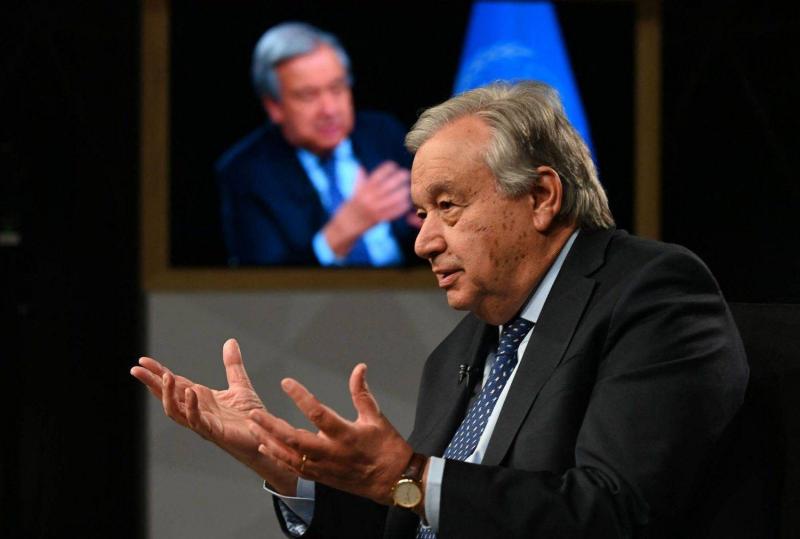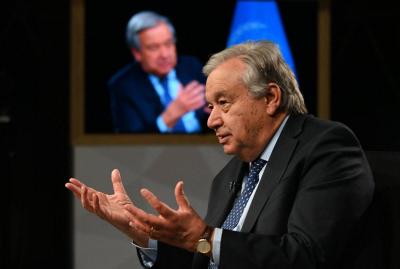Daily scenes of death and destruction from the Israeli war on the Gaza Strip have prompted the UN Secretary-General to activate "the strongest tool he has" in the organization's charter to alert the Security Council that what is happening there "threatens the maintenance of international peace and security." This is the first time that António Guterres has activated Article 99 of the charter since becoming UN Secretary-General in 2017.
The explicit text of Article 99 states, "The Secretary-General may bring to the attention of the Security Council any matter which in his opinion may threaten the maintenance of international peace and security." Guterres emphasized in a letter to the Security Council on Wednesday that, in order to confront the grave danger of the collapse of the humanitarian system in Gaza, "I urge the Security Council to help avert a humanitarian catastrophe and call for a humanitarian ceasefire."
Stefan Dujarric, the spokesperson for the UN, noted that the Secretary-General "is activating the authority granted to him by the charter," in what could be described as "a significant constitutional step," because Article 99 is "the strongest tool" available to the Secretary-General within the framework of the UN Charter. Dujarric further stated that the UN is "approaching a point of total paralysis" in its humanitarian operations in Gaza, where more than 15,000 people have died, including 130 UN personnel. He added that the Secretary-General does not use the word "catastrophe" lightly and expressed hope that the Security Council would heed the Secretary-General's call.
#### What is Article 99?
Among the five articles in the UN Charter that delineate the duties of the Secretary-General, Article 99 is the most important, as it pertains to international peace and security. It grants the Secretary-General the authority to "bring to the attention of the Security Council any matter which he sees may threaten the maintenance of international peace and security." In this way, Article 99 allows the Secretary-General to initiate a discussion in the Security Council on a specific issue, pressuring the members to take decisive action regarding the preservation of international peace and security.
Dag Hammarskjöld, who served as the UN Secretary-General from April 10, 1953, to September 18, 1961, stated that Article 99 "is more important than any other article, as it transformed the Secretary-General from a mere administrative officer into a figure possessing clear political responsibility." When the drafters of the UN Charter considered including Article 99, they were concerned with assigning responsibility to the UN Secretary-General "that requires the exercise of the highest qualities, political judgment, tact, and integrity."
The primary goal of Article 99 is to deal with situations where the dynamics of the Security Council face difficulties in reaching an agreement on discussing emerging conflicts. By alerting the Council to situations that pose a risk to international peace and security, it can encourage Council members to focus on their role in preventing conflicts and activating the set of tools outlined in Chapter Seven, potentially leading the Council to take effective steps.
The consideration to include Article 99 arose from the long-standing recognition within the Security Council of the need for early warning of imminent international crises, aiming for the Council's tasks to be more focused on prevention rather than dealing with problems that threaten peace and security belatedly. Despite prevention often being adopted as a goal for the Council, its implementation has proven difficult. The lack of early warnings, risk analysis, and the capacity to gather intelligence has been among the reasons the UN failed to respond adequately to the genocides in Rwanda and Srebrenica in 1994 and 1995, respectively.
For example, a report on the UN's failure to handle the humanitarian crisis in Rwanda concluded that "it is essential to continue to improve the organization's capacity to analyze information related to potential conflicts and respond to them, as well as its operational capacity for preventive actions."
#### What Does Resorting to Article 99 Mean?
Resorting to Article 99 is rare, and the first instance in which the use of Article 99 led to the Security Council taking action was Hammarskjöld's message dated July 13, 1960, in which he requested an urgent meeting of the Council regarding Congo. While the Secretary-General did not explicitly reference Article 99, he employed its language when he stated, "I must draw the attention of the Security Council to a matter which, in my opinion, may threaten the maintenance of international peace and security." The meeting held following Hammarskjöld's message led to the Council authorizing a UN military operation the next day to assist the Congo government.
This article has been invoked numerous times in various countries.




